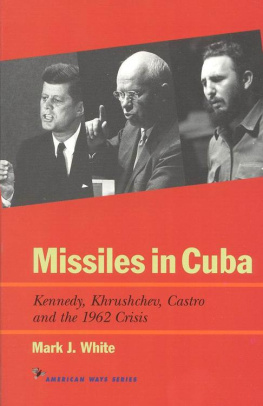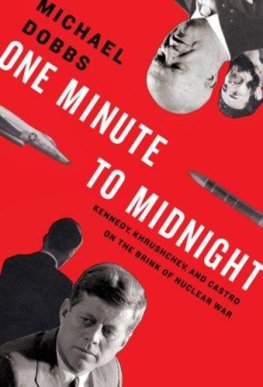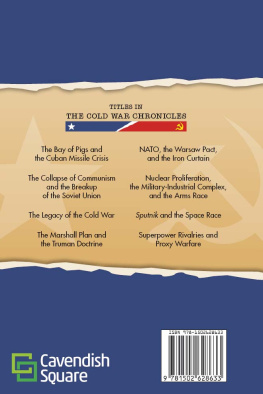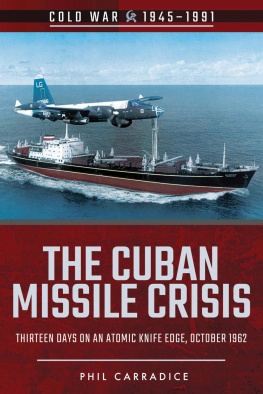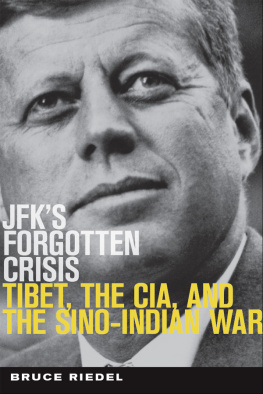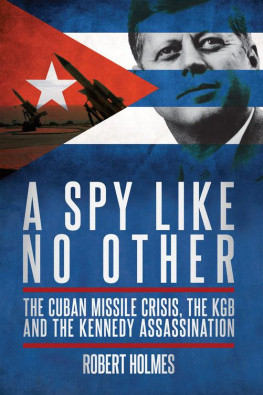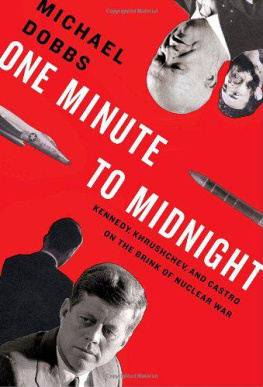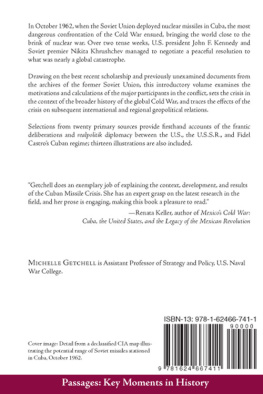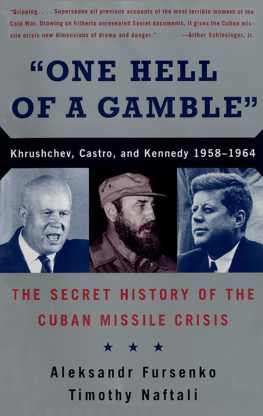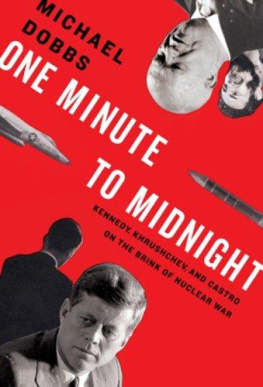Missiles in Cuba
MISSILES IN CUBA
Kennedy, Khrushchev, Castro
and the 1962 Crisis
Mark J. White
The American Ways Series
IVAN R. DEE Chicago
MISSILES IN CUBA. Copyright 1997 by Mark J. White. All rights reserved, including the right to reproduce this book or portions thereof in any form. For information, address: Ivan R. Dee, Inc., 1332 North Halsted Street, Chicago 60622. Manufactured in the United States of America and printed on acid-free paper.
Library of Congress Cataloging-in-Publication Data:
White, Mark J.
Missiles in Cuba : Kennedy, Khrushchev, Castro and the 1962 crisis / Mark J. White.
p. cm. (The American ways series)
Includes bibliographical references and index.
ISBN 1-56663-155-6 (cloth: alk. paper). ISBN 1-56663-156-4 (paper : alk. paper)
1. Cuban Missile Crisis, 1962. I. Title. II. Series.
E841.W49 1997
For R. A. White and N. J. White
Preface
HISTORIANS HAVE recently redefined their work on the Cuban missile crisis in a chronological sense. For many years they concentrated on those thirteen days in October 1962 when the world came to the brink of nuclear war. This focus has now been supplemented by an equally intense interest in the roots of the crisis. Thus this book devotes two chapters to the roles played by the United States and the Soviet Union (and to a lesser extent, Cuba) in bringing on the crisis, and a third chapter to those crucial few weeks immediately preceding it.
I have made use of the great number of books and articles written by historians and political scientists on the missile crisis, and memoirs by participants. But many important documents have recently been made available and have not yet been incorporated into historical and analytical accounts. For this book I have examined the new documentation, which includes materials on Operation Mongoose from the National Security Archive in Washington, D.C.; tapes of the October 18 and 22, 1962, ExComm meetings from the John F. Kennedy Library, Boston; and correspondence between Soviet officials in Washington and Havana and their colleagues in Moscow that has been published under the auspices of the Cold War International History Project of the Woodrow Wilson Center.
My thanks to John Braeman and Ivan Dee for their generosity and expertise. I am indebted to the School of History and International Relations at the University of St. Andrews for a grant that enabled me to conduct research in Washington, D.C. William Burr and Ian Stevenson of the National Security Archive, and James Hershberg, have directed my attention to many important materials; their assistance has been invaluable. And I am grateful to Steve Spackman for his support and wise counsel at an important time.
M. J. W.
Charleston, Illinois
January 1997
Missiles in Cuba
1
Background to Crisis
AT THE START OF 1959 an uprising in Cuba, led by the dynamic young revolutionary leader Fidel Castro, resulted in the overthrow of Fulgencio Batista, the countrys longtime corrupt dictator. From that moment the United States was faced with a dilemma in the Caribbean that in many ways represented the central challenge for American foreign policymakers in the twentieth centuryhow to respond to revolution.
The United States was itself the product of a successful revolution, one of watershed importance in that it signaled the shift away from the ancien rgime to a new liberal, middle-class order in the Western world. Less than a decade after defeating Britain in the War of Independence, however, Americans observed events in France after 1789 and wondered whether revolution was a good thing. Some political leaders, notably Thomas Jefferson, generally applauded the French revolutionaries as akin to Americas Founding Fathers. Others, such as Alexander Hamilton, were appalled by Frances violence and social upheaval.
By the twentieth century this American ambivalence toward revolution had become an almost total repulsion. Whereas earlier revolutions, such as those in Europe in 1848, might be interpreted as promoting the sort of liberal-capitalist order congenial to the United States, those after 1900, such as the Bolshevik Revolution in Russia in 1917, often seemed to bring about state-dominated, anticapitalist economic policies and dictatorships rather than democratically elected leaderships. The onset of the cold war after World War II, and the accompanying fear among Americans that their chief adversary, the Soviet Union, was actively promoting the Communist movement overseas, made American leaders even more wary of revolution. Thus in the twentieth century the United States emerged as the worlds leading status quo power, and particularly so after 1945.
Nowhere was American determination to maintain order and stability stronger than in the Caribbean. The geographic proximity of that area meant that the application of military, political, or economic pressure from Washington was usually a simple matter. This was especially true for the island of Cuba, located only ninety miles off the Florida coast. In 1898 President William McKinley had intervened in the conflict raging between Cuba and its colonial master, Spain. After defeating the Spanish and acquiring a number of territorial possessions in the process, the United States technically granted Cuba its independence. In reality, however, Cuba became an American protectorate. The decades after 1898 saw the United States deploy troops on the island on several occasions, a policy sanctioned in 1901 by the U.S. Senate.
When Castro came to power, the administration of Republican President Dwight D. Eisenhower, at the midpoint of his second term, was unsure how to respond. On the one hand, Castro held out a promise of genuine democracy. He talked of free elections and initially appointed a number of Cuban liberals to important positions in his government. On the other hand, he appeared at the very least to accept that Communists would play a significant role in the new Cuba, especially when in mid-January 1961 he legalized the Communist party.
In recent years it has been fashionable for historians to applaud Eisenhowers foreign policy. He has been portrayed as a cautious, skillful statesman, one who managed both to stand up to the Communists when necessary and to defuse dangerous cold war crises, such as the 19581959 dispute over access to Berlin. But Eisenhowers record on Cuba does not lend support to such a positive interpretation. Although Castro often provided him with good reason, Eisenhowers policy toward Cubas new leader was one of swiftly escalating hostility. In many ways the tactics he adopted in dealing with Castro set the tone for the policies of his successor.
In March 1960 Eisenhower approved a Central Intelligence Agency (CIA) program for Cuba which included the creation of a paramilitary force outside of Cuba for future guerrilla action. Implementing that directive, by late summer the CIA had established a training camp in Guatemala for a group of Cuban exiles. This initiative laid the groundwork for what would later become an abortive invasion of Cuba, the Bay of Pigs operation. But this was only one ingredient in Eisenhowers anti-Castro policy mix. In the summer of 1960 he introduced what he himself described as economic sanctions. He cut the amount of sugar imported from Cuba as retaliation for Castros decision to take control of the oil refineries of Shell and other American companies in Cuba. Eisenhower broke off diplomatic relations with Cuba in January 1961 after Castro ordered most of the personnel in the American embassy in Havana off the island. In addition to all this, the CIA began devising plots to assassinate Castro, though the extent of Eisenhowers knowledge of them is not clear, while contingency plans for the direct use of American force against Cuba were developed in the Defense Department. Hence Eisenhower bequeathed to his successor a Cuban policy based on the application of covert, economic, diplomatic, and potential military pressure.
Next page
